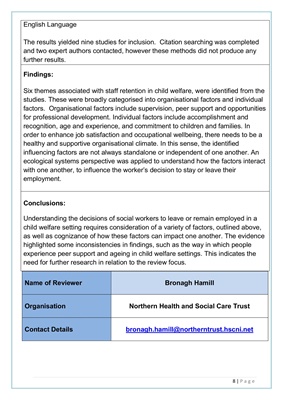
8 | P a g e
English Language
The results yielded nine studies for inclusion. Citation searching was completed
and two expert authors contacted, however these methods did not produce any
further results.
Findings:
Six themes associated with staff retention in child welfare, were identified from the
studies. These were broadly categorised into organisational factors and individual
factors. Organisational factors include supervision, peer support and opportunities
for professional development. Individual factors include accomplishment and
recognition, age and experience, and commitment to children and families. In
order to enhance job satisfaction and occupational wellbeing, there needs to be a
healthy and supportive organisational climate. In this sense, the identified
influencing factors are not always standalone or independent of one another. An
ecological systems perspective was applied to understand how the factors interact
with one another, to influence the worker's decision to stay or leave their
employment.
Conclusions:
Understanding the decisions of social workers to leave or remain employed in a
child welfare setting requires consideration of a variety of factors, outlined above,
as well as cognizance of how these factors can impact one another. The evidence
highlighted some inconsistencies in findings, such as the way in which people
experience peer support and ageing in child welfare settings. This indicates the
need for further research in relation to the review focus.
Name of Reviewer
Bronagh Hamill
Organisation
Northern Health and Social Care Trust
Contact Details
bronagh.hamill@northerntrust.hscni.net